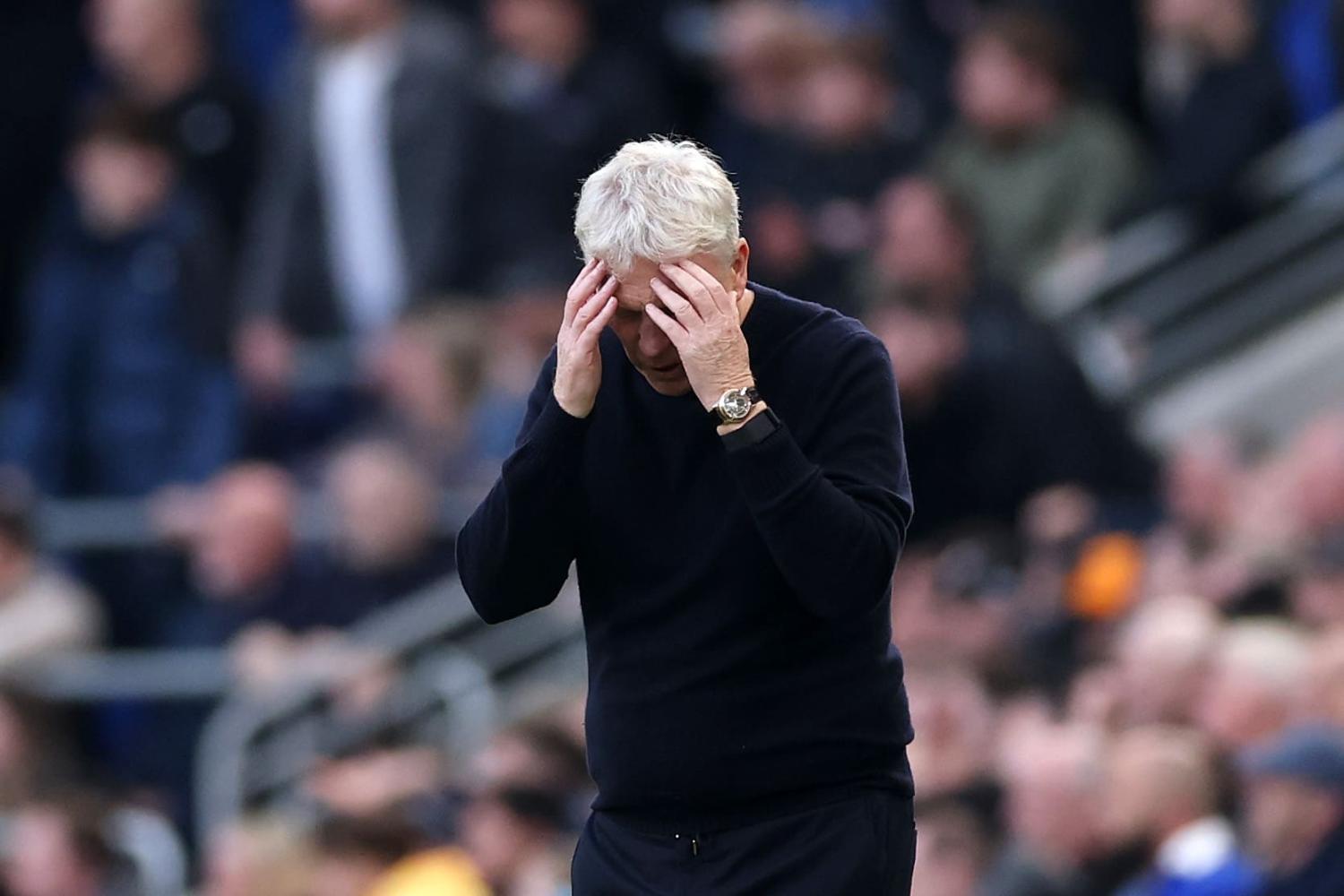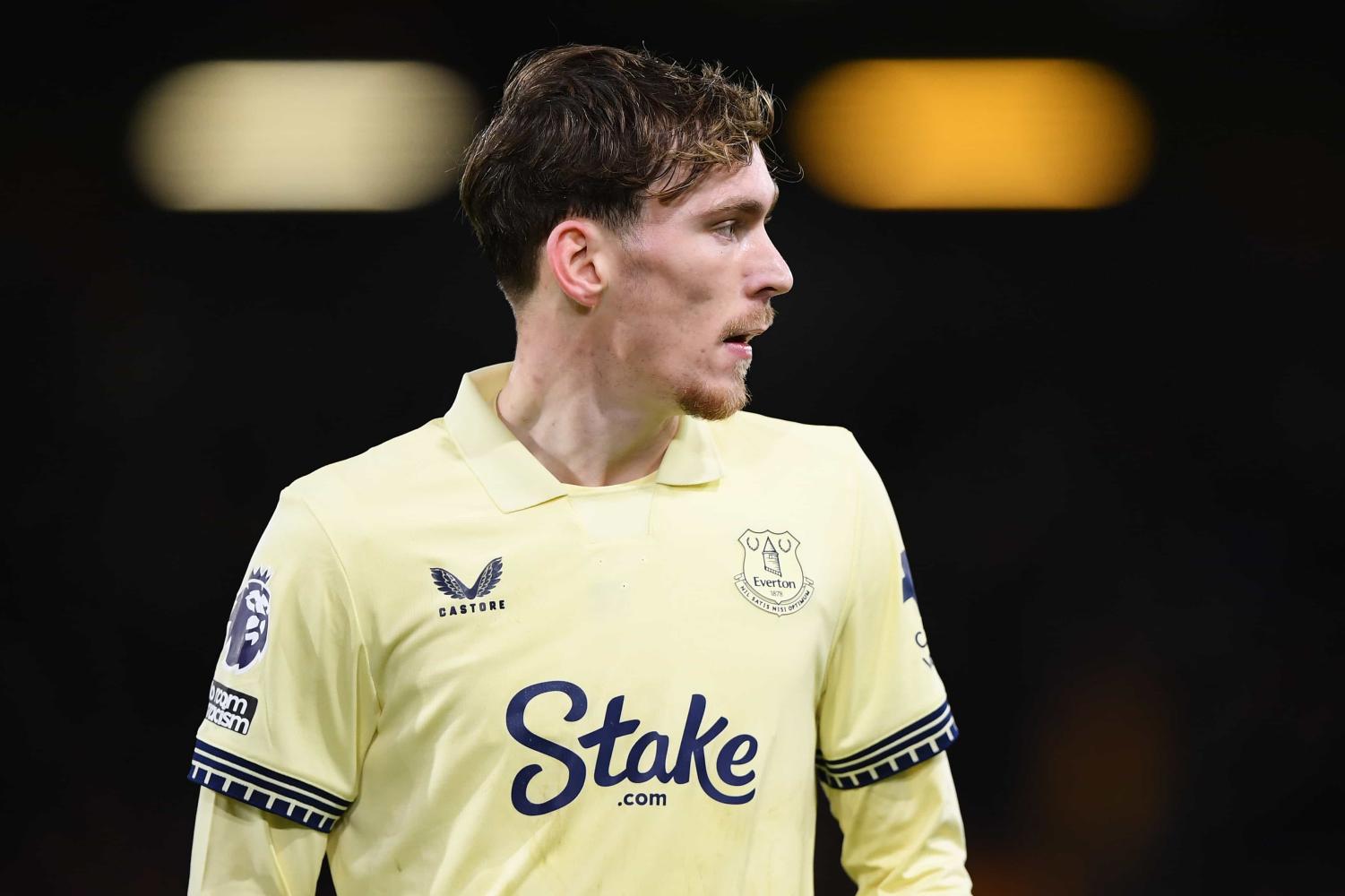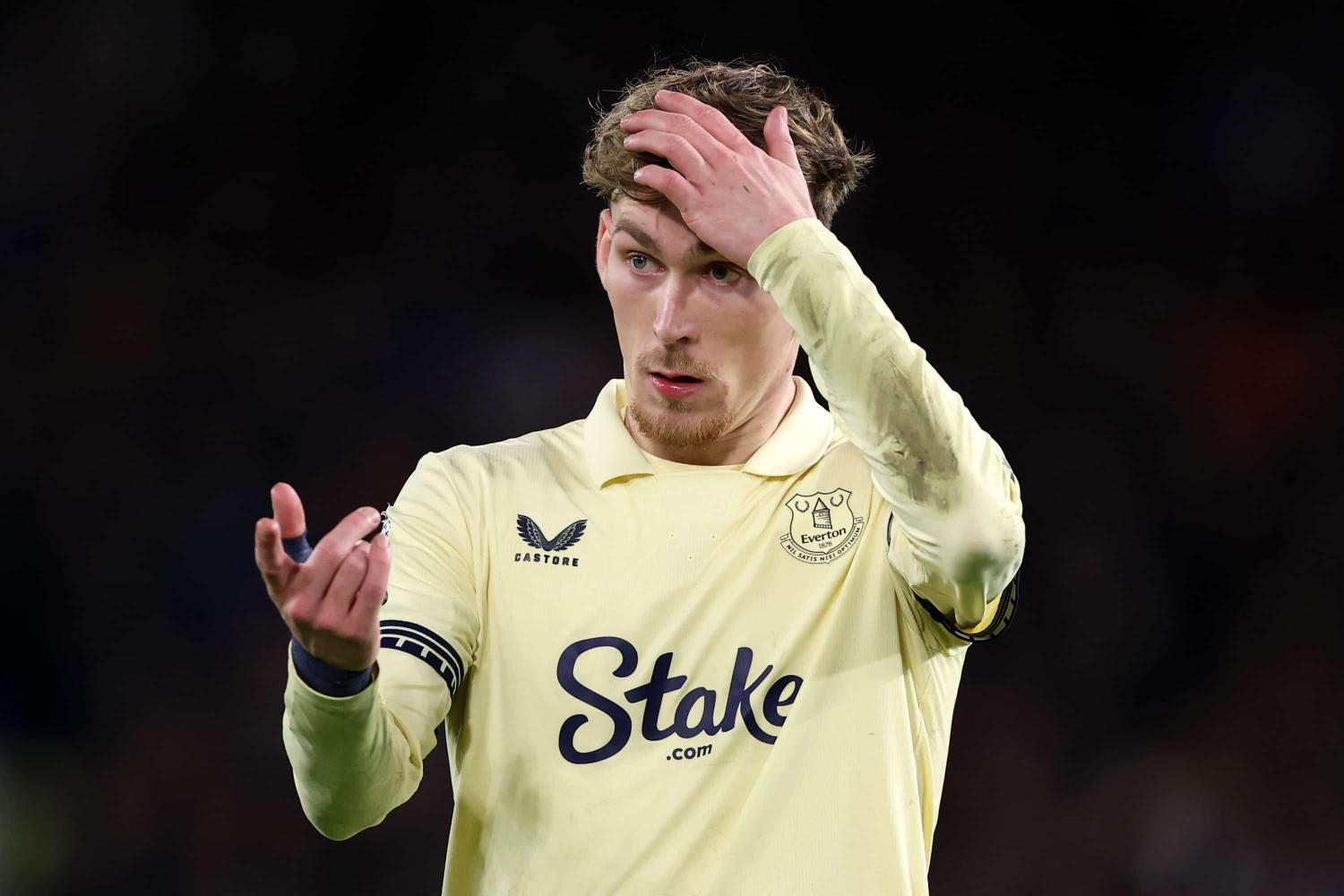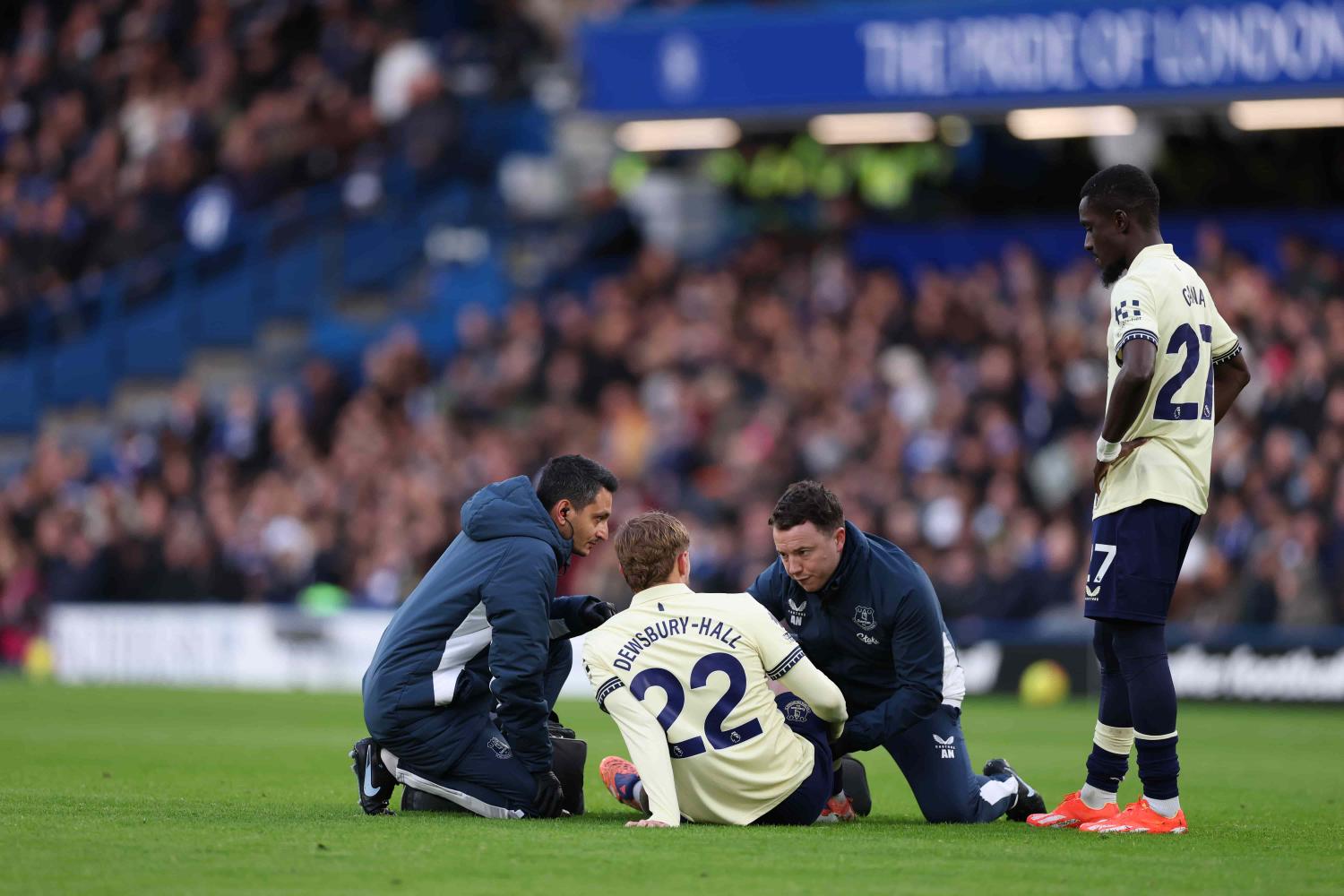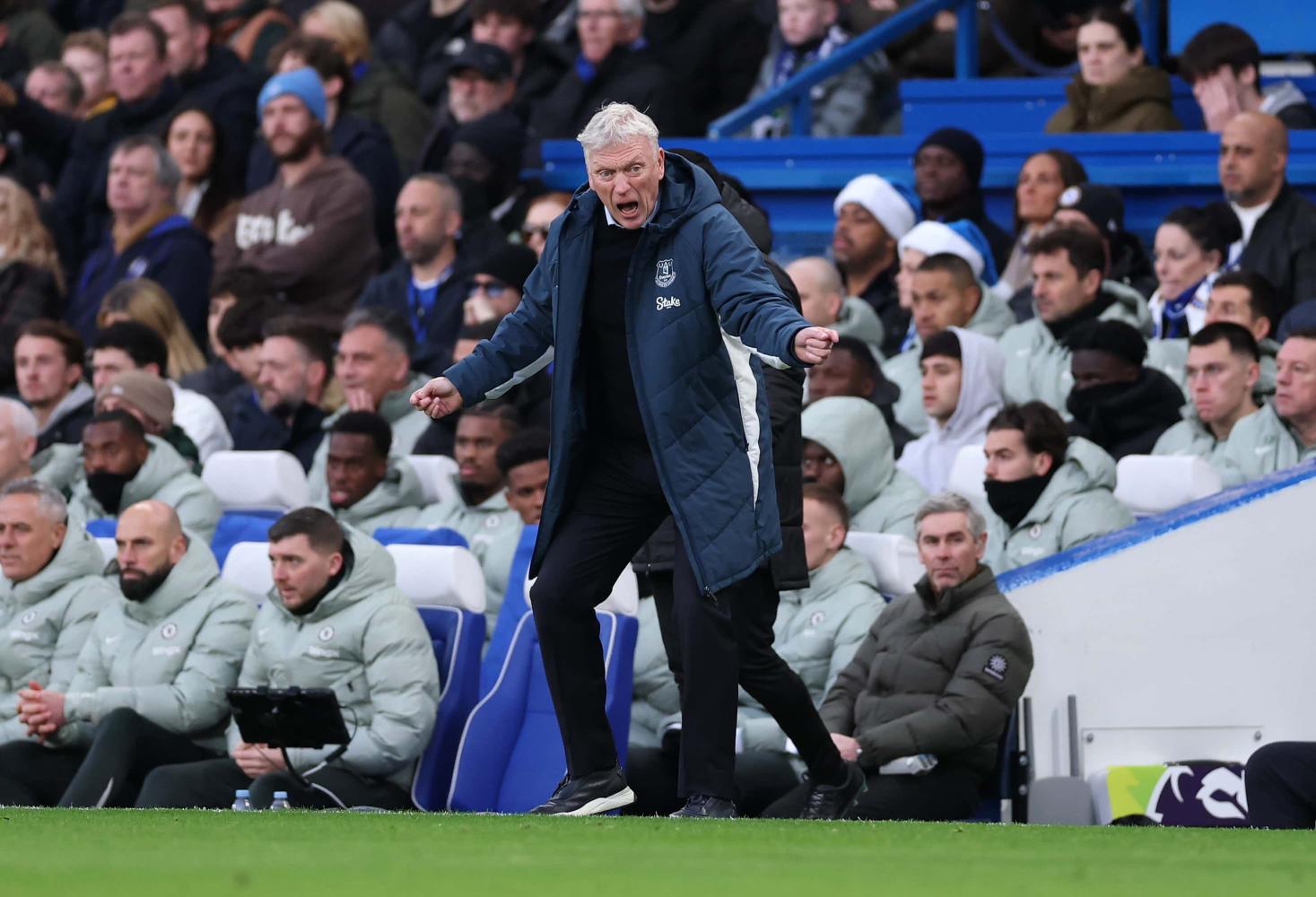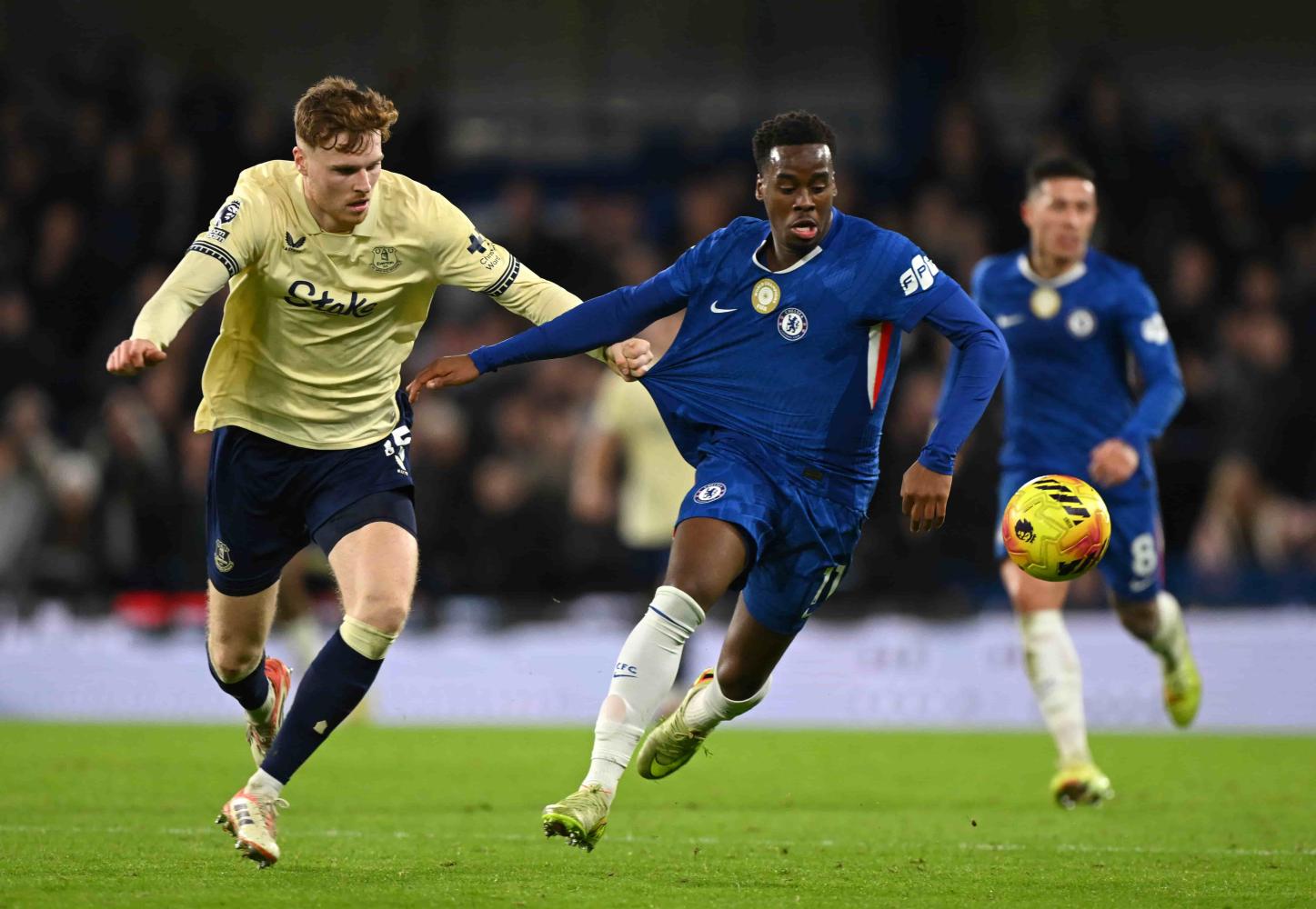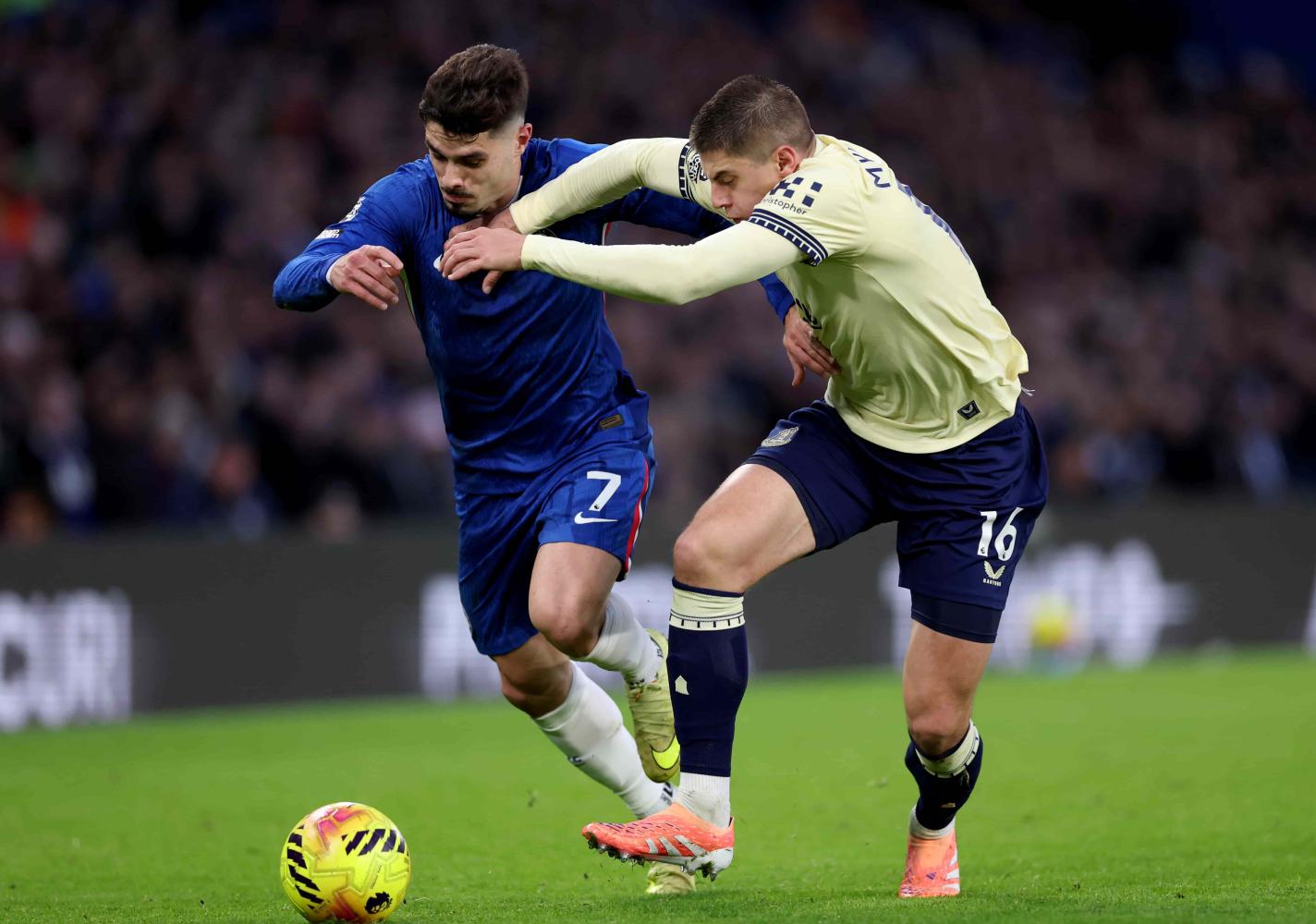Everton Papertalk, 1998-99
|
Selected news reports and articles form the media will be reproduced occasionally on this page, under the Fair Use copyright convention. |
|
PAGE CONTENTS |
|
|
Dacourt helps Everton hand despite perils of card game |
| Henry Winter, Electronic Telegraph, 3 April 1999 |
|
OF WALTER SMITH'S eclectic range of recruits at Everton, Olivier Dacourt
has proved the most consistently impressive. A £4 million signing from
Strasburg, Dacourt is even privately admired, if not yet coveted, by the
champions, Arsenal. The Frenchman has added drive, a decent pass and a touch
of bite to Everton's midfield, invariably starting when fully fit and free
from suspension.
Therein lies the rub. Hugely competitive but certainly not dirty, Dacourt has rattled up 13 yellows and one red card, a tally that has had him banned for five games to date. If Dacourt falls foul of David Elleray in today's inevitably heated Merseyside derby, he will be up before the beak at Lancaster Gate with the prospect of a fine and another four games on the sidelines. "I don't think about getting yellow cards now," Dacourt said yesterday afternoon. "It's part of life. The manager bought me for my game and that includes a little bit of aggression. I can't change my game just because I get yellow card after yellow card. I must keep my passion." Dacourt's words echo those emanating from his compatriots, Arsenal's Emmanuel Petit and Patrick Vieira, who have complained about English refereeing, stressing that football remains a physical contact sport. Dacourt agreed. "Before I came here, I thought you could make hard contact with players in the tackle. "Now you cannot make hard contact. If you touch someone now, the whistle goes and it's a yellow card. Before, you used to get a warning first but now it's a yellow card immediately. That's life. I don't want to speak bad about referees. I never get a yellow card for dissent or pulling shirts, just for tackle, tackle, tackle." It is the price of life in the centre-field crucible. It still represents a substantial problem. Against Manchester United recently, Dacourt was cautioned and then trod so carefully that he allowed a United runner to create a goal. Roy Keane was not present that day at Old Trafford but he performed at Goodison and dominated Dacourt's thoughts. "Ahhhh," Dacourt sighed in admiration. "Roy Keane is the boss on the pitch. He is an example to us all. He talks all the time. He tells his players to do this and that. He does not lose the ball. I know Vieira and Petit well but, for me, Roy Keane is the best player I have played against since coming here." Today pits Dacourt against Paul Ince, a contest that might need Elleray's full attention. "Paul Ince is very good," Dacourt said of the former Inter Milan man. "If you have played in Italy you must be good because Italy is very difficult. But I am not afraid of him. He has two feet, two hands, he is human. I respect him but I'm not afraid of any player." Dacourt is no stranger to derby-day intensity. "Strasburg-Metz is a big derby. Strasburg don't like Metz and Metz don't like Strasburg. It's a similar derby to this one except Everton and Liverpool are in the same city. You can ask Rigobert Song [Liverpool's former Metz defender] about what happens when Strasburg and Metz play. It's a very hard game. Tomorrow will be the same." The football is unlikely to be pretty. Liverpool, the more attractive side, have not won a derby fixture for five years, with Everton rising more hungrily to the occasion. In another season of embarrassing under-achievement at both ends of Stanley Park, today's match counts for so much. Local bragging rights are not the only things at stake. If a freakish collection of results unfold at the Dell, the Valley and Ewood Park, Everton could be second from bottom by 4.50pm. "Whether we are playing Manchester United, Arsenal, Chelsea or Liverpool, the approach is the same: we need the points," Dacourt continued. "If we beat Liverpool, we have supremacy in the city but the most important thing is the points." Dacourt suggested it was only a matter of time before Liverpool, under his fellow countryman, Gerard Houllier, rose again. "He was national coach when I played for the under-21s. He is not having any luck at Liverpool but I know he will do a good job there. I'm sure of that. He just needs a little time." As for Everton's Frenchman, Dacourt brushed aside the compliment that he had proved one of Goodison's few pluses in a hugely disappointing season. "For me, I prefer the team to be doing better and me to play average. The most important thing is the team. Our big problem is in attack. We don't score a lot. Our defence has done very well, we haven't let in a lot of goals." Only Arsenal (four) and Leeds (seven) have conceded fewer than Everton's nine at home but Smith's misfiring strike-force have managed only a similar number of goals at Goodison. Even Nottingham Forest have scored four more than Everton at home. "We have a lot of draws [eight] at home - 0-0, 0-0, 0-0," Dacourt recited. "If we had won those 1-0 we would be in the top five. If Duncan Ferguson had stayed, it would have been better. Defenders are afraid of him and he scored a lot. It was a big error of the [former] chairman [Peter Johnson] to sell Duncan to Newcastle." Although frustrated by Ferguson's departure, Dacourt played on, showing his typical determination while relying on conversations with Vieira, Bernard Lambourde, Marc Keller and Remi Garde to steer him through any awkward patches. "It's difficult to adapt quickly when you arrive in another country and another style of football," said Dacourt. "Before I came, I spoke a lot to Pat [Vieira]. He helped me prepare for the game and the life in England." Dacourt has settled in well on and off the field. "I live over the water, on the Wirral. Mark Wright, the old player of Liverpool, is my neighbour." Like many of the overseas players, Dacourt has explored his temporary domicile. "I have been to London, which is a beautiful city. Manchester is more beautiful than Liverpool. "I think the most important thing for people in Liverpool is not the city but the football clubs. It's incredible. People live for the football here. I have a lot of respect for this." Evertonians have a lot of respect for Dacourt, which would rise even further if he can help Smith's troubled team upset the neighbours today. |
|
Harvey the happy harvester |
| Alex Hayes, The Independent on Sunday, 7 March 1999 |
|
YOUR STARTER for ten. Which English club has the most potent youth team in
the land?
Alex Hayes meets the old boy nursing the new boys of Goodison Manchester United? Arsenal? Liverpool? Actually, it is the blue half of Merseyside, Everton, who won the Youth Cup last year and have reached the last eight this season, after beating Sheffield Wednesday 3-1 on Monday. While their more illustrious colleagues are struggling in the Premiership, the "Baby Toffees" are dominating the nursery game, like the grown-ups last did in the Eighties. It should come as no surprise, then, to learn that the man leading the present mission – "to have a team that is full of Scouse kids" – was at the heart of the last. Colin Harvey joined Everton as an apprentice in 1962 and made 384 League and cup appearances for them. After retiring in 1976, he took charge of the youth set-up – helping to nurture the talents of such youngsters as Steve McMahon, Paul Lodge and Kevin Ratcliffe – before Howard Kendall appointed him first-team coach. Together, they masterminded the Eighties golden era. Eighteen months ago, the Everton board offered Harvey the opportunity to rejoin the club he had left in 1993, in order to run their new Youth Academy. "I had no hesitation in returning," said Harvey, now 55, at the Bellefield training ground. "The club had ambitious plans for the youth team, and I believed I could do the job." Having made his first-team debut at the age of 18, in the European Cup against the great Internazionale side of the early Sixties, Harvey is ideally placed to appreciate the difficulties a young player faces. "As I went through every stage at the club, I suppose it does give me an insight into what's needed and how the kids are feeling," he admitted. "I guess it rubs off." Harvey's influence will be evident at St James' Park today when Everton meet Newcastle in the FA Cup. Both Danny Cadamarteri and Francis Jeffers have recently broken through, while Michael Ball and Richard Dunne have already made an impact. Despite his obvious success, Harvey shies away from the limelight much as he did for three years when he managed the senior side after Kendall's departure in 1987. "Being Youth Cup champions is not the be-all and end-all. Our job is to get players to the first team," he insisted. "When a kid arrives here, he is basically raw material. Then we mould him into an Everton player: someone competitive who can play attractive football. "That's the job, really. Doing well in youth competitions is a bonus. What you strive for is a bunch of lads who aren't just going to do well for a season, but will be consistent," continued Harvey, who is a keen supporter of manager Smith. "We get on smashing," he said. "The fact that he's putting my players in the team proves that." Comparisons with the Manchester United youngsters are possibly premature, though Harvey seems flattered. "That's what you want. Ideally, you would like to have a team that is full of Scouse kids, who have been with the club since they were nine, and all want to stay with us until they finish their careers," he said passionately. But while Paul Scholes, David Beckham and Gary Neville were integrated into a winning side, the fruits of "Harvey's Harvest" are being thrust into a fight against relegation. "It's always difficult to introduce young players to the first team. Ideally, you would like to play them in a stable situation and blood them gradually. But they wouldn't be in the side if Walter didn't think they were good enough." Not that any of his players have looked out of place. "Lads like Ball and Cadamarteri may have had to make the step up a little bit earlier than most, but they have established themselves in the team now, and are there on merit," insisted Harvey. As for Jeffers, the 18-year-old who is sinking his teeth into that most difficult of tasks, scoring goals for Everton, little seems to faze him. After scoring the equaliser against Wimbledon last weekend, he remarked: "How can it bother me playing in front of 35,000 at Goodison when I've played in front of 70,000 Germans for England Schoolboys?" Oh, of course. So, while Arséne Wenger is buying young players abroad, Harvey is more than happy grooming local talent. "To find good players you need to look as comprehensively as possible. I can understand why Arsenal go out to France and pay a small amount now rather than £5m in the future, but I am delighted with the British lads. The important thing is for us to teach them good basic technique. If we can do that, the rest will follow." For Harvey, the dream is simple. "It would be lovely if, in four years' time, the Everton team – made up entirely of local lads – were playing in the European Cup," he enthused. If the club can solve the boardroom struggles, and resist the urge to change managers again, his blue vision might yet become reality. |
| Time is on the side of the Everton midfielder who has faced many setbacks after showing such youthful promise, writes Louise Taylor in The Sunday Times, 7 February 1999 |
|
FOOTBALLERS love talking about "respect" but many might baulk at following
Nick Barmby's example and exhibiting it by happily jumping into their cars
before embarking on lengthy trans-Pennine January journeys.
A fortnight ago Barmby's admiration for Peter Beardsley dictated that he treated the near 400-mile round trip between his Warrington home and St James' Park as a pilgrimage. "It was Peter's testimonial and, as he's always been my hero, I went up to Newcastle," said Everton's attacking midfielder over a pot of tea at Bellefield, the Merseysiders' training ground. Hyped as "the new Beardsley", Barmby bonded with the original when the pair were England room-mates before Euro 96. Putting young pretenders and old masters in such close proximity often provokes jealousy and insecurity, but the newcomer was soon at ease. "With the press making a big thing of it being me or Peter for a place in the squad there could have been an atmosphere between us, but he was fantastic," he said. "Peter's given me a lot of advice. He loves the game so much, he can't let go, which is why he's turning out for Hartlepool." But why is Barmby, formerly of Tottenham and Middlesbrough and twice the subject of £5m-plus transfers, playing for defensively-orientated, goal-shy, relegation-flirting Everton at Derby County today? Why is he out of an England side he once illuminated? This, remember, is a son of Hull who Pele predicted would become a world star. Somebody whose magnetic two-footed control, inventive passes and defence-debilitating changes of pace wowed Jurgen Klinsmann at Tottenham before ensuring he either scored or created every goal Bryan Robson's Middlesbrough registered in the first 12 games of their 1995-96 Premiership campaign. "My ambition is to get back into the England team but I try to block frustration out," said Barmby. "I know it hasn't gone that well but I've never had one regret about moving to Everton. There is something about this place that's really special, the people are very friendly and I don't want to leave. "I've been very impressed with Walter Smith's management, he's stamped his authority on the club and is hard but fair. Considering everything that has gone on at board level, the dressing-room spirit is surprisingly good. But it is going to take the manager time to get things sorted and he's started by making defence the priority." Appreciating that life is too short to waste on residual bitterness when he harbours far more reasons for contentment than most, Barmby tries to keep things in proper perspective. "I know my goals have dried up and I need to start scoring again but I still enjoy football, still love the game. I consider myself very lucky to have my hobby as my job." Capable of volleying outstanding training ground goals, his penalty area positioning can betray him in matches, but he explains that Everton's necessarily defensive emphasis presently cramps his preferred style. At 5ft 7in and 11st, Barmby excels at dropping off physically imposing strikers and exploiting space between midfield and attack, but Everton's shoestring frontline resources demand that he sometimes serves as an ersatz centre-forward. Mustering elbow grease has never been a problem for a player who insists his principal quality is "giving 100%" but pre-Smith he contended with the loss of Joe Royle, the manager who signed him, before slowly winning over Howard Kendall while struggling with injuries. Not that such mitigating factors should obscure the fact that Barmby's Middlesbrough pomp saw him deployed in a 5-2-2-1 configuration. "A great formation: we had two midfielders who sat back, leaving Craig Hignett and me to use the space between them and Jan Fjortoft. It took everyone by surprise and I noticed Glenn Hoddle adopted it at Chelsea," he smiled. Coincidentally, Hoddle's first international as England coach saw Barmby earn the last of his 10 caps, scoring against Moldova in the process. "Eileen Drewery wasn't around then," he said. "And everybody enjoyed Glenn's coaching." Like Hoddle, Robson succumbed to a self-destructive urge to meddle with a successful formula, buying Juninho from Brazil. "I soon realised I couldn't play in the same team as Juninho," Barmby said. "When I dropped off, I'd always find him in the same place; we just got in each other's way. I think he's a fantastic player, though, and I'd love to see him back at Middlesbrough." Bitchiness and resentment simply do not seem to feature in Barmby's make-up; indeed he is possibly too reasonable. As one former Boro colleague put it: "Nick was very self-critical, very intense about his game; he wanted to do well so badly, he almost tried too hard." The rugby league-loving teetotaller, dubbed Duracell by team-mates noting his enviable resistance to fatigue, certainly has a stubborn, fiercely independent streak. While at Tottenham, Barmby, 25 on Thursday, courted family disapproval by marrying a woman seven years his senior. Unfazed, this unlikely rebel silenced the censure by forging an evidently strong, enduring marriage with Mandy and their son, Jack. Instinctively open-minded, even if he is implacably opposed to the next England coach being a foreigner, he addresses the "are too many overseas imports in British dressing rooms a bad thing?" question with typical balance. "English players can cause problems too, it's more about personality than nationality. I do think that fans relate to local players though - look at Peter Beardsley and Newcastle." When he wakes on Thursday, Barmby should recall that it was not until shortly after his role model's 25th birthday that Beardsley won the first of his 59 England caps. There is ample time to prove Pele right. |
| John Giles, Express Live, 16 November 1998 |
|
Everton boss Walter Smith has to make one huge decision which I believe is
central to his survival at Goodison. It would be the bravest move ever made
by the man who brought such sustained glory to Glasgow Rangers.
Smith has to get rid of Duncan Ferguson. He has to push aside the big Scot's popularity with the fans, the sense that one day all the foibles and frustrations will fall away and reveal a big and consistently brilliant thoroughbred. It is an appalling dilemma in which Smith finds himself. On Sunday his team was slaughtered by fellow strugglers Coventry. But at no point did I detect a sliver of difference in the distribution of talent in the two teams. The point of separation was honesty. Coventry's strikers Darren Huckerby and Noel Whelan worked slavishly in the vacuum left by their old team-mate Dion Dublin. They ran endlessly, they supported each other. Ferguson? It was the same old Duncan. He has tremendous talent, can be witheringly effective in the air and has a smooth touch on the ground. He should really be one of the top strikers in the Premiership. But he is not. He is a classic example of underachievement. I would not say Ferguson cheats every time he pulls on the shirt of Everton. But I will say this: a more honest approach would bring a much more dramatic yield from all those enviable natural gifts. For Smith the problem is intensified by the fact that Ferguson is a Merseyside cult figure. The fans love his combative style, his feisty approach to officials and, sometimes it seems, the entire world. But if they analysed his contribution to the team a little more carefully they might be less enthusiastic. They might consider the careless use of his elbows and the free kicks he needlessly concedes when Everton are applying pressure. Compounding the difficulty is that Ferguson is captain of the team. He is supposed to be the team's role model. But what the team get from Ferguson is not true leadership. They get an attitude of aggression but it is one without real substance. If Ferguson was just another component of the team, someone who only occasionally hit the heights his talent promised, it would not be so bad. But Ferguson has become bigger than the team for no better reason than that he is a man of great ability who on any given day may remind us of his gifts. But those days are just too infrequent. Certainly there was a simple reason for the radically different moods of Smith and Coventry boss Gordon Strachan on Sunday night. Strachan could see a vein of energy running right through a team who were scoring their first back-to-back wins of the season. He could a see a work ethic emerging at every point. He saw the craft and leadership of Gary McAllister, the Scottish veteran who is still recovering from a long injury lay-off but was able to provide the insistent prompting so absent in Ferguson's approach. Smith desperately needs the collective conviction which gave such a vital launching pad for the fireworks of Huckerby and Whelan and the inconsistent but potentially brilliant Steve Froggatt. Already Smith has invested heavily in Everton's Premiership survival, but as long as Ferguson dominates the scene I suspect further buying will bring no greater reward. It is one of the most basic situations in football. Ferguson is the man at Goodison. He is inevitably deferred to in the dressing room. Young players will follow his lead. Unfortunately they see a player of quality going about his business at his own pace and to his own liking. It is simply not good enough, and for Smith the problem is central to his prospects at Everton. Soon he will confront the basic question facing every embattled manager considering the contribution of his main player. It comes down to this: who goes, you or me? Smith is probably not in the mood to create a storm of controversy on Merseyside at this early stage of his regime. But my suspicion is much pain will be saved down the road if he moves now. Smith has to get Everton moving sooner rather than later. His job depends upon it. He has to close the book on the big man who just doesn't deliver. |
| Alan Smith, Daily Telegraph, 26 October 1998 |
|
MORE than a few eyebrows were raised last season when Howard Kendall, Everton's
manager at the time, allowed Andy Hinchcliffe to join Sheffield Wednesday.
Losing the England left-back seemed to leave Everton desperately short of options in that department. But as the season progressed and one man in particular plugged the gap, it became clear that the sale of Hinchcliffe was not such a rash move after all. Michael Ball stepped in and straightaway settled down to the task. His performances were so impressive that although it was based on just half a season's work, the 18-year-old came in runner-up to Duncan Ferguson as Everton's Player of the Year. On Saturday, Everton visited Sheffield Wednesday so Ball lined up on opposite sides to Hinchcliffe. In the 4-4-2 system favoured by manager Walter Smith, the Liverpool-born teenager occupied a midfield berth out on the left where he found plenty of room to show his skill. If he is indeed a more natural defender than midfielder, Ball's forward play certainly did not lack imagination or composure. As the rain lashed down during the first half, he mastered the soggy surface better than most with a sure touch and accurate passing. A clever ball fed Ferguson for a shot and then neat chest control won a dangerous free kick on the edge of the penalty area. While it was difficult to gauge the quality of his defending because it was rarely called into question, one crunching challenge on Ritchie Humphreys was evidence enough of Ball's bravery in the tackle. Known as "the German" by team-mates for his blond, Aryan looks, Ball also seems to have that same cool temperament under pressure. After John Collins missed from the penalty spot on the opening day of the season, up stepped the youngster to volunteer his services. Since he was in the same year as Liverpool's Michael Owen at Lilleshall's school of excellence, perhaps such willingness to accept responsibility comes with the package. In what was a fairly drab game without much goalmouth incident, Ball had to give a disciplined and workmanlike performance. Yet whenever he got the ball on to his favoured left foot, his side's prospects brightened considerably. Once or twice he sent over swerving crosses that nobody could latch on to, but occasionally a lack of concentration let him down. In fact, one of the better chances of the match fell to Ball towards the end. Ferguson rolled in a tempting pass that Ball miscued and dragged wide from 15 yards. In view of his overall vision and intelligence in attack, though, a wing-back role, a la Graeme Le Saux, is probably Ball's ideal position. A regular in the England Under-21s, coach Peter Taylor thinks he is ready for promotion. And with the Wembley friendly against the Czech Republic approaching, perhaps now is as good a time as any. |
| Douglas Alexander, The Sunday Times, 4 October 1998 |
|
THE POSE is familiar, even if the surroundings are not. Walter Smith stands
scratching his chin, deep in thought, while Archie Knox barks instructions
at a group of players. It could easily be Rangers working out in Glasgow,
but, instead, the venue is Everton's Bellefield training ground in Liverpool.
Back at his desk, Smith is obviously still preoccupied. The Everton manager doodles a football pitch on a pad and starts placing dots on it. The goalposts loom disproportionately large. You don't have to be a psychologist to work out what is occupying Smith's mind: how can his side start scoring? Everton have played four games at home this season without finding the net. Their record at Goodison comprises three goalless draws and a 1-0 defeat by Tottenham. The famine that afflicts them at home is not so acute when they travel: four away games have produced six goals, including two in a win at Wimbledon yesterday. Nevertheless, improvement is required. "We've got one of the best defensive records, but we've got to try and get a better balance. We've got to start making sure we threaten the opposition's goal. Apart from John Oster, we don't have natural wide players and, Duncan Ferguson aside, we don't have out-and-out forwards who jump in with their share of goals." Smith was not slow to wield the chequebook in attempting to correct inadequacies at Ibrox and he has shown similar instincts at Goodison. Howard Kendall, his predecessor, moaned that big-name players would not consider a move to Everton. By signing John Collins from Monaco, in the face of keen opposition from his Premiership rivals and Paris Saint-Germain, Smith immediately signalled his intent and the rebuilding continues. As soon as the Department of Employment hands him a work permit, Ibrahim Bakayoko, the coveted Ivory Coast international, will arrive from Montpellier for £5M, taking Smith's spending in three months close to £17M. He hopes Bakayoko, in tandem with Ferguson, will produce goals, although he will continue his hunt for a winger to provide the most feared forehead in England with better ammunition. The inference is that Ferguson, a cult hero with the Everton fans, will not be used to fund further rebuilding. Those who deduced he would be, because Smith, while Rangers manager, sold Ferguson for £4M, forget that he also bought him for that fee. The argument that an over-reliance on Ferguson has been a primary cause of Everton's malaise apparently holds no weight with Smith. "It's wrong to say that Everton have been held back by Duncan Ferguson. I think he's been keeping them up. People say that he's lazy, but, for me, he's been as hard working as any player in the team. What he needs more than anything else is people around him. He doesn't want the ball lumped in the air all the time, he's not that type of player. The temptation is there if you are struggling to get a goal. We need to supply everybody with more options." While trying to inject creativity into his own team, Smith must also contend with former allies, who possess such qualities, yet are intent on causing him harm. Requiring a winger, he will cast envious glances towards Stamford Bridge, where Brian Laudrup is a luxury rather than a necessity for Chelsea. He has already encountered Paul Gascoigne in Everton's 2-2 draw with Middlesbrough at the Riverside Stadium a fortnight ago. "I enjoyed managing Brian and Paul. There are different skills, but in creative terms they were the two most talented I worked with in my time at Ibrox. It was a pleasure to be involved with them. I think people in England thought it was easy for them to be successful in Scotland, but it wasn't that easy. I think they will both do well down here. They will certainly have no problems in terms of ability." Smith, in common with Gascoigne and Laudrup, may feel like a school dux, who, arriving at university, finds there are, after all, other people as clever as him. He is careful never to belittle Scottish football, where he won six championships in succession, but he knows the slightest scuffed shot, mistimed tackle or tactical gaffe will be amplified in the League table. "The margin for error is very thin indeed. John [Collins] missed a penalty in the first game and Duncan got through last Saturday against Blackburn and hit a post. These two opportunities would have given us four points and put us on 11 points. We are not unique – a lot of teams in the League can look back like that. That's what makes it interesting. "I had been involved in coaching and management for 18 years in Scotland. The whole thing down here is different, there's a real freshness and a bit of anticipation about building a team again, although we don't get an awful lot of time to do that nowadays." The only regret Smith nurses about his departure from Rangers last May, was the unprecedented, for him, failure to secure a piece of silverware – "my biggest disappointment in football". Otherwise he believes the time was ripe for a parting of the ways. "The biggest difference you can make in any team is the manager. You can change the players, but the whole thing remains much the same. I'd had my time at Rangers and it was the right decision by everybody concerned. It was also the right decision to break up the team when we did. If anything it was a little bit too late, but if that's blaming the chairman for a little bit of loyalty, you can't do that, because he always gave his backing to everybody." David Murray, chairman of Rangers, gave Smith the chance to melt into the comfort of a backroom role at Ibrox. The manager's polite interest in such a post was betrayed by a series of hints that he wanted to try his hand at an English Premiership club. Two came knocking on his door, Sheffield Wednesday first, then Everton. Many felt Hillsborough offered better prospects, in terms of stability and money for players, but not Smith. "I was very impressed by Wednesday and, particularly, by their chairman, but when I looked at Everton I just felt they had a good football tradition. I enjoyed the rivalry between Rangers and Celtic and I saw the Everton and Liverpool situation was similar. "They are both footballing cities and there is nothing flash about the people. They are solid and they like their football. Everton are, or were, among the top six clubs in England. They have winning potential, if we can manage to turn the team around." The size of that task can be measured in the opponents Everton face in the next month. After next week's break for international matches, they play Liverpool, Manchester United and Arsenal in three weeks. Time for some frantic doodling – in red ink. Copyright © 1998 Times Newspapers Ltd. |



